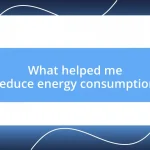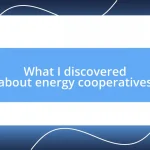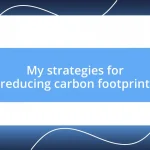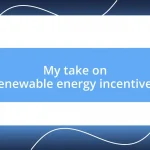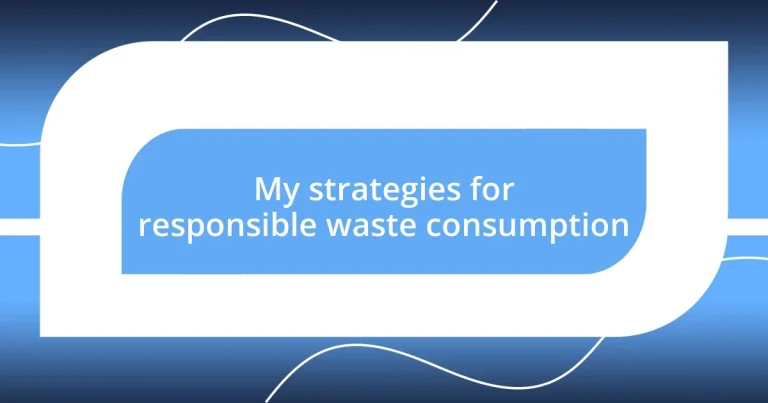Key takeaways:
- Understanding personal waste consumption is crucial for implementing meaningful changes and fostering sustainable habits.
- Responsible consumption helps combat climate change, conserve resources, and promote ethical practices while nurturing future generations.
- Community involvement and engagement can amplify waste reduction efforts, leading to collective accountability and innovative sustainability practices.
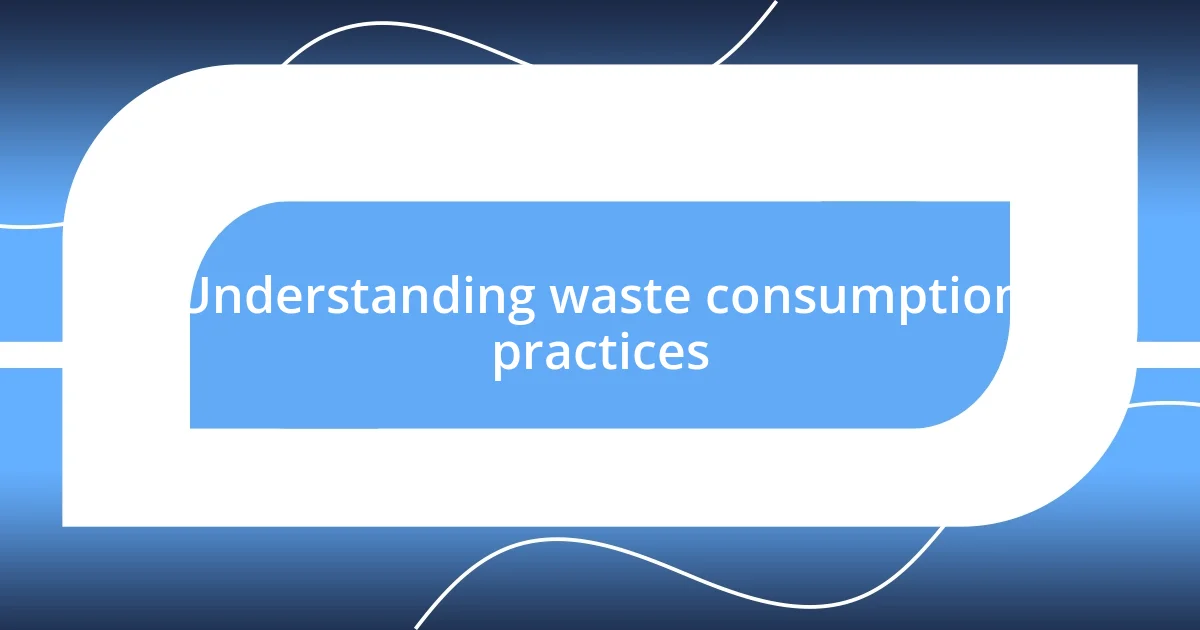
Understanding waste consumption practices
When I first started to pay attention to my waste consumption, I was shocked by how much I produced in a single week. It’s easy to overlook the small things, like those seemingly harmless plastic bags I used for groceries or the extra food I tossed out without a second thought. Have you ever paused to think about what happens to all those items? It can be overwhelming, but understanding our waste consumption practices is the first step toward making meaningful change.
I remember a time when I did a week-long challenge to track every bit of waste I generated. It was eye-opening—my trash can was filled with wasted food and packaging that should have been recycled. This experience made me realize how our daily habits contribute to larger environmental issues. It challenges me to ask: what small changes can I implement in my life to shift my consumption patterns?
Personal consumption habits aren’t just about what we throw away; they reflect our relationship with resources and our community. For example, I started opting for bulk products to reduce packaging waste, which not only helped the planet but also saved me money. It’s amazing how interconnected our choices are—what are some habits you think you could change to reduce your waste? Each tiny shift can lead to a more sustainable lifestyle.
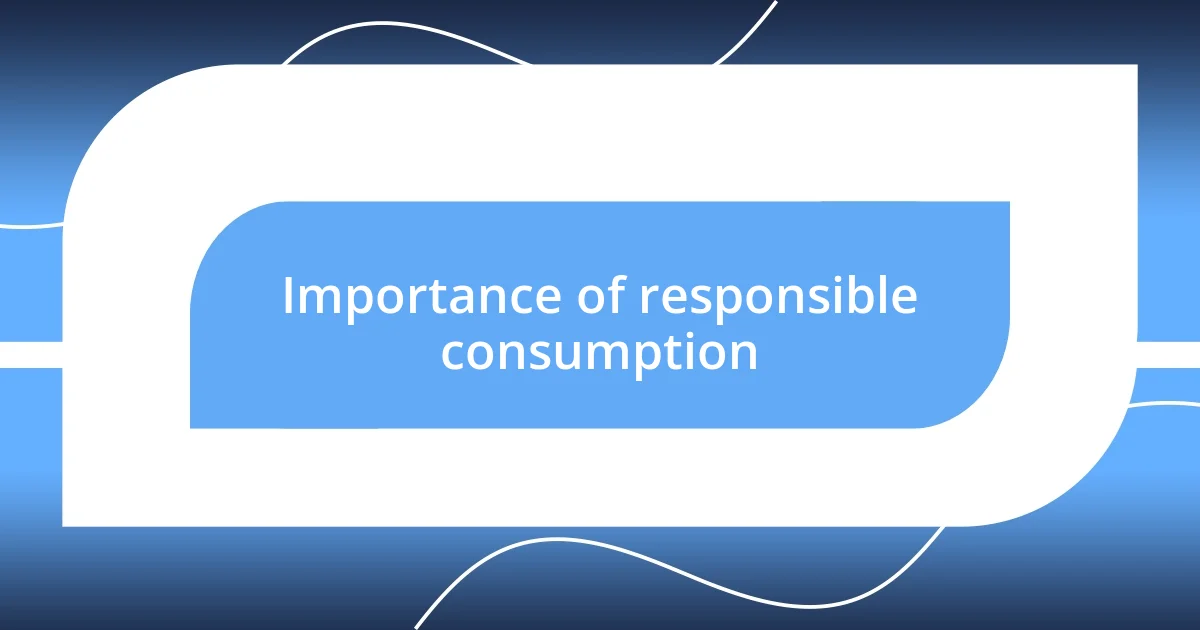
Importance of responsible consumption
Responsible consumption is crucial for ensuring the well-being of our planet and future generations. I vividly recall my reaction during a community cleanup event when I saw firsthand the sheer volume of waste carelessly tossed aside. It struck me in a profound way—my daily choices significantly impact the environment. By practicing responsible consumption, we can reduce plastic pollution, save natural resources, and foster a sense of community around sustainability.
Here are some key reasons why responsible consumption matters:
- Combatting Climate Change: Each conscious choice helps lower carbon emissions associated with production and waste.
- Resource Conservation: Using fewer resources means we’re safeguarding the planet’s finite materials for future generations.
- Promoting Ethical Practices: It encourages companies to adopt sustainable practices when they see consumer demand for responsibly sourced products.
- Empowering Local Communities: Supporting local businesses fosters a more sustainable economy and builds stronger community ties.
- Nurturing Future Generations: Teaching responsible consumption habits to children cultivates a culture of care for our planet.
Reflecting on these reasons inspires me to rethink my consumption patterns further. For instance, I started supporting local farmers by purchasing seasonal produce, which not only reduces the carbon footprint from transportation but also strengthens community connections. It’s these small but impactful changes that illuminate the path toward a more sustainable future.
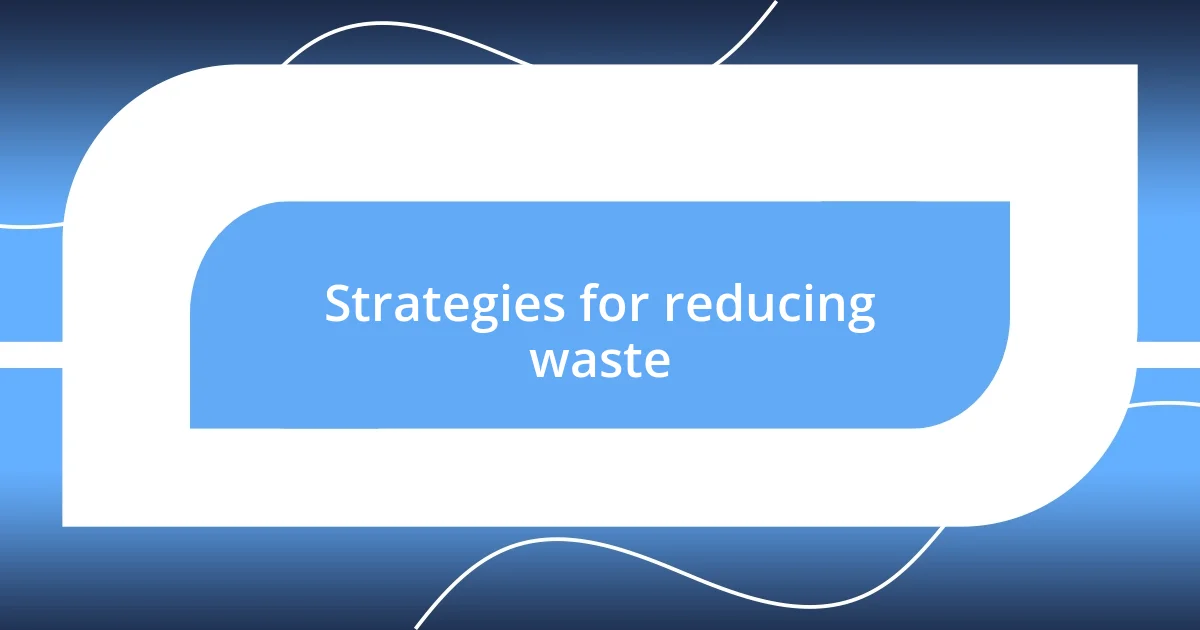
Strategies for reducing waste
Reducing waste can start with something as simple as evaluating our purchasing choices. I’ve found that shifting to products with minimal or no packaging can have a profound effect on the amount of waste I generate. For instance, switching to bar soap instead of liquid soap in plastic bottles was a small change that made me feel good about my impact.
Another strategy that has markedly reduced my waste is embracing meal planning. Before I began planning my weekly meals, grocery shopping felt like a chaotic treasure hunt, often leading to food spoilage and regret. But now, with a curated shopping list, I’m not only saving money but also minimizing food waste exponentially. Have you ever tried meal planning? If not, it might surprise you how much easier it makes both shopping and cooking!
| Strategy | Benefit |
|---|---|
| Switching to bulk items | Reduces packaging and often saves money |
| Meal planning | Minimizes food waste and enhances organization |
| Using reusable bags | Significantly cuts down on single-use plastics |
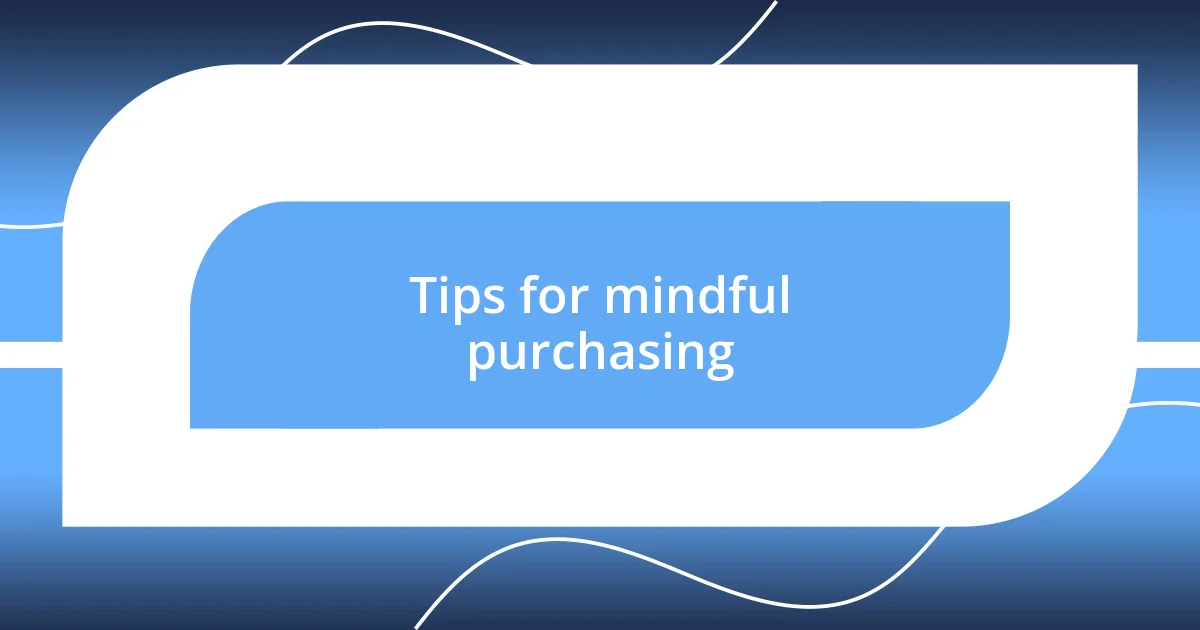
Tips for mindful purchasing
I find that approaching purchases with a clear mindset can make a substantial difference. Before I buy anything, I often ask myself, “Do I really need this?” This simple question helps me pause and reflect on the necessity of the item. Just the other day, I was tempted by a trendy gadget. After a moment of consideration, I realized I hadn’t even used the last one I bought. It’s amazing how taking that extra second can lead to more intentional purchasing.
In my experience, researching products before making a decision can significantly enhance mindful purchasing. I often dive into customer reviews or seek out information about a company’s values and sustainability practices. Recently, while searching for a new pair of shoes, I discovered a brand committed to ethical manufacturing and using recycled materials. This insight not only made my choice easier but also gave me a sense of pride, knowing my money was supporting a company that aligns with my values. Have you ever considered how much impact your research could have on your purchasing habits?
Lastly, I’ve learned that creating a wish list can help curb impulse buying. I used to be swayed by fleeting desires, but now, when I see something I love, I jot it down and revisit it after a week. This cooling-off period usually reveals whether I truly want the item or if it was just a passing whim. Once, I noted a beautiful decorative piece for my home. After a week, I realized it didn’t resonate with me as I initially thought. It felt liberating to let it go, and instead, I used that energy to invest in something I genuinely cherish. Have you tried this technique? You might find it not only helps your budget but also enhances your overall mindfulness in purchasing.
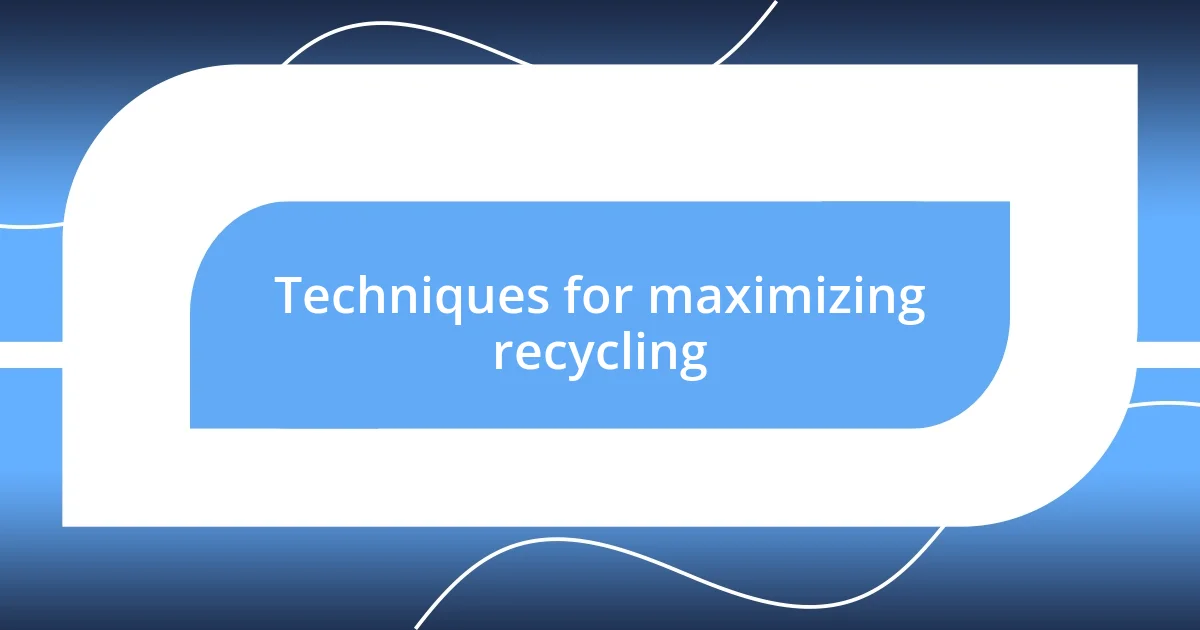
Techniques for maximizing recycling
Maximizing recycling can really transform how we interact with waste. For me, it starts with knowing what materials are recyclable in my area. I remember the first time I got confused about whether to toss an item into recycling or the trash. A quick online search led me to my local recycling guidelines, and since then, I’ve made it a point to keep that information handy. Have you checked your local rules recently? It’s amazing how different communities can have varying specifications!
Another technique that has worked wonders for me is creating a designated space for recyclables in my home. Initially, I used to throw everything together, which made sorting a cumbersome task. Then I installed a simple sorting station in my kitchen. Now, I separate cardboard, plastics, and glass as I go, and it has streamlined my recycling process immensely. The small effort I put in when I’m clearing the countertop saves me lots of time later. Isn’t it funny how simplifying a task can encourage us to stick with it?
Lastly, I’ve discovered the power of engaging my family in recycling efforts. When I first started, I was recycling alone, which felt a bit isolating. But when I involved my kids, it became a fun family activity. We went through old toys and papers together, discussing what could be recycled and what was truly trash. Witnessing their excitement as they learned about sustainability sparked a deeper conversation around waste. How do you involve others in your recycling efforts? Sharing the responsibility can really amplify the impact!
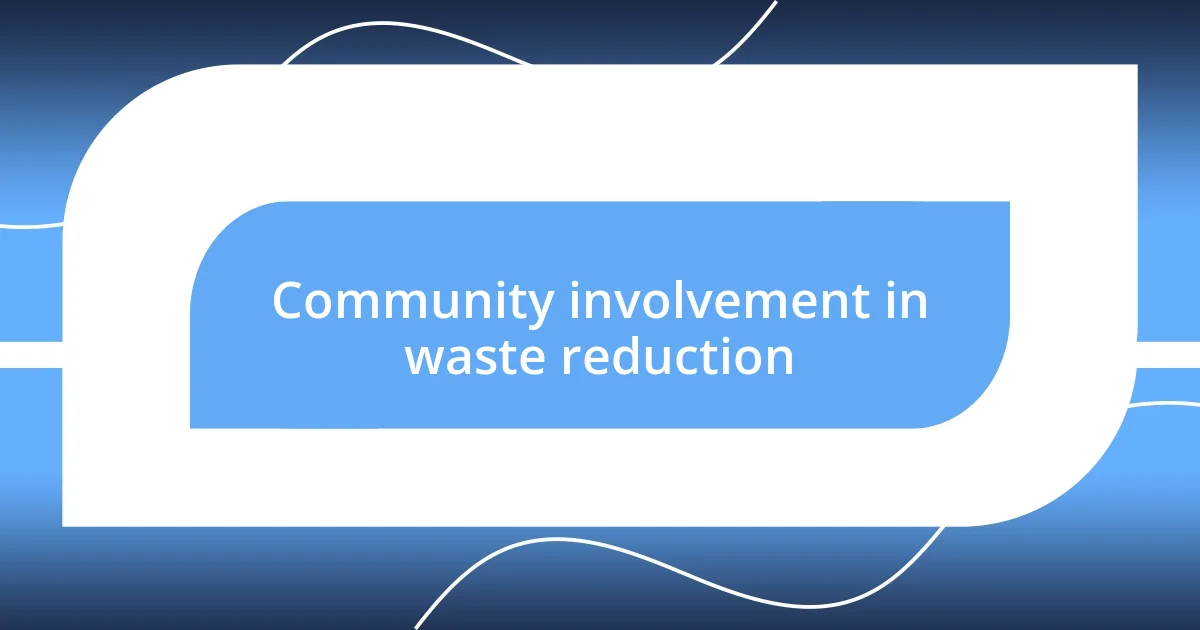
Community involvement in waste reduction
Community involvement is crucial for effective waste reduction, as it creates a sense of accountability among neighbors. I remember attending a local clean-up day in my community, where we spent a Saturday picking up litter in our park. Not only did I meet some wonderful people, but it was heartening to see how collective effort can lead to noticeable changes. Have you ever experienced that sense of unity in your neighborhood activities?
Organizing workshops on waste management can also empower communities to take charge of their waste. I once participated in a session hosted by a local environmental group, where we learned creative ways to repurpose items typically thrown away. It was fascinating to see how a simple glass jar could transform into a beautiful planter or storage solution. Has your community ever held a similar event? These hands-on experiences make sustainable practices more relatable and enjoyable.
Moreover, involving local businesses in waste reduction initiatives can create a ripple effect in the community. In my town, a few cafes started offering discounts for customers who brought reusable containers for takeout. It encouraged a shift in mindset and got people thinking twice about single-use items. Have you noticed businesses adopting such practices in your area? It’s a refreshing reminder of how collaboration can strengthen our commitment to sustainability.



